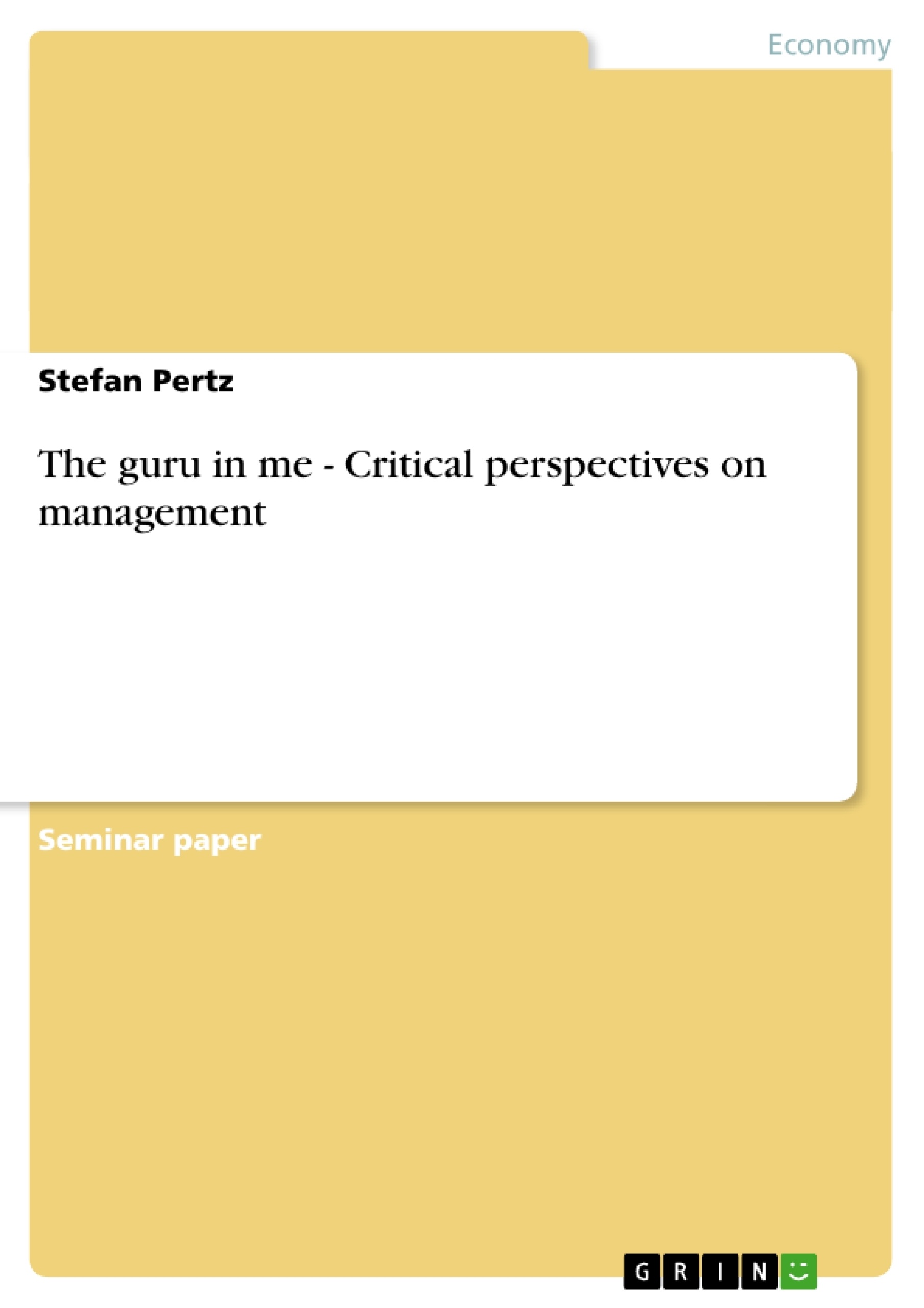"Peters is ... the father of the post-modern corporation."
Why do people follow Gurus?One explanation can be the search for meaning in life. They offer fulfilment and promise a peaceful and happy life .
Herein the emphasis lies on management Gurus. Can we transfer the above to a management context? In management we follow rules, rituals and symbols. Every morning we are called to the holy mass, worshipping the corporate identity manual and confessing our companies inability to
keep the promise of short delivery times to our customer . Our consultant will teach us by showing us how we can improve quality, reduce wastage and improve happiness in our jobs.
Tom Peters with his work on "excellent companies" lay the foundation of the work presented. Utilizing postmodernist techniques, the author challenges the teachings of the so called management gurus.
Decentering, deconstructing and reflecting back on itself the author critically re-evaluates his personal guru. As a result a new perception of the circle commonly known as management gurus materializes and the insights gained are to be used as a tool in modern management.
Are modern managers mislead in their thinking by following the wrong ideas?
Inhaltsverzeichnis (Table of Contents)
- Introduction
- How do we recognise a Guru if we see one?
- The chosen One - Tomas Peters, the preacher of a new religion
- What makes this person a Guru?
- Me without you
- The making of a Guru or what I have learned about the Guru
- Insights about the process
- The real me
Zielsetzung und Themenschwerpunkte (Objectives and Key Themes)
This essay explores the concept of a management guru and examines the reasons behind their perceived status. The author utilizes the figure of Tom Peters, a prominent management guru, as a case study to deconstruct the phenomenon of guru-ship, applying key concepts from the course "Critical Perspectives on Management." The analysis aims to understand the factors that contribute to the recognition of gurus, evaluate the effectiveness of their teachings, and reflect on the impact of such figures on both the individual and the broader management landscape.
- The concept of a "guru" in the context of management
- The role of knowledge and expertise in shaping guru-ship
- The influence of timing and cultural context on guru status
- The application of critical perspectives to deconstruct the phenomenon of guru-ship
- Personal insights gained from the deconstruction exercise
Zusammenfassung der Kapitel (Chapter Summaries)
- Introduction: This section defines the term "guru" and explores its historical and religious origins. It then applies the concept to the modern context of management, suggesting a parallel between religious rituals and managerial practices.
- The chosen One - Tomas Peters, the preacher of a new religion: This chapter introduces Tom Peters as the chosen subject for the analysis. It briefly discusses Peters's credentials and his prominence in the management world, citing his best-selling book, "In Search of Excellence." The chapter also acknowledges the existence of guru rankings and Peters's position within them.
- What makes this person a Guru?: This section delves deeper into the reasons why Tom Peters can be considered a guru. It examines how his expertise, his ability to identify and articulate critical concepts, and the timing of his work contributed to his status. The chapter also discusses the importance of criteria for assessing guru-ship and the use of factors like sales figures, internet popularity, and influence as indicators of a guru's impact.
Schlüsselwörter (Keywords)
The central keywords and topics of this work include management guru, critical perspectives on management, deconstruction, knowledge, expertise, influence, cultural context, timing, and personal insights. These themes are explored through the lens of Tom Peters, a prominent management guru, and his book "In Search of Excellence." The analysis examines the factors that contribute to guru status and the potential impact of such figures on management practices and individual development.
Frequently Asked Questions
What is a "Management Guru"?
A management guru is a charismatic leader or consultant whose ideas and teachings are followed by managers, often resembling religious devotion or rituals.
Why is Tom Peters considered a guru?
His status is based on his influential book "In Search of Excellence," his ability to identify critical business concepts, and his high internet popularity and sales figures.
How does the essay use postmodernist techniques?
The author uses techniques like deconstruction, decentering, and reflection to critically re-evaluate the teachings of management gurus and their impact on corporate thinking.
Are management practices comparable to religious rituals?
The essay suggests a parallel where worshiping a "corporate identity manual" or following set rituals in the office mirrors religious practices like attending mass.
What is the risk of following management gurus?
Modern managers may be misled by following simplified or wrong ideas in their search for meaning, potentially overlooking the complexities of their own organizational reality.
- Citation du texte
- BA (Hons) International Management Stefan Pertz (Auteur), 2005, The guru in me - Critical perspectives on management, Munich, GRIN Verlag, https://www.grin.com/document/34976



